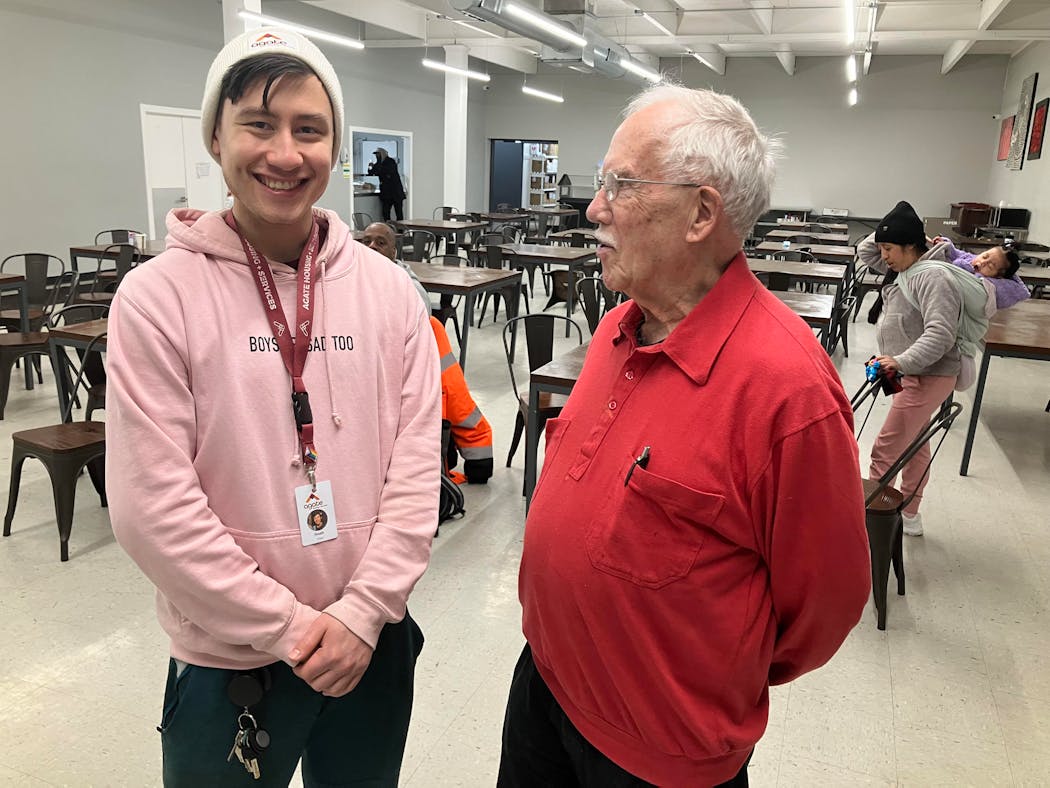In 1952, Ted Pouliot, a senior at Minneapolis DeLaSalle High School, noticed a "bread line" nearby on Nicollet Island, then part of the city's "skid row." He volunteered to help Brother DePaul Kondrak, a 23-year-old DeLaSalle graduate who had recently opened House of Charity.
At 90, Pouliot is still volunteering weekly at House of Charity, located downtown at 714 Park Av. S., since urban renewal pushed DePaul off Nicollet Island in the 1970s.
"I help people connect with employment training, housing, medical or other services," said Pouliot, who has a related website, Socialservicesmn.org, that functions as an online connector to needy folks. "I always liked being of service."
Pouliot is a retired small business owner and artist. He also has collaborated internationally with Aid to Artisans, and volunteered for years. He has produced paintings and murals for House of Charity and Project for Pride in Living, the housing and employment-training nonprofit that he helped start with Joe Selvaggio in the 1970s.
DePaul died in 2010 at age 81 in his native northeast Minneapolis. He was a lay clergyman, never ordained, who was credited with helping feed, shelter and otherwise assist thousands of poor folks, after first witnessing destitution and alcoholic despair on Nicollet Island while a DeLaSalle student. He moved to Haiti in the 1980s to work with nuns and others who educated and sheltered children.
Pouliot, the former owner of a globe-spanning design firm that specialized in artificial trees and plants for the hospitality industry, helped DePaul on everything from fundraisers attended by politicos and businesspeople to a job-producing factory in Haiti in the 1980s.
House of Charity merged in 2021 into housing-and-self-sufficiency nonprofit St. Stephen's Human Services to form Minneapolis-based Agate Housing and Services. It includes House of Charity's food operation, two downtown shelters for 80 residents and scattered-site housing.
The dining hall and grocery-distribution on Park Avenue was destroyed by a fire started by a mechanical malfunction in January 2022. The refurbished, expanded operation reopened last year. The three-meal, 365-day-a-year dining hall is staffed by about 10 employees and volunteers. Pouliot assists clients every Wednesday. His colorful paintings decorate the dining hall.
Helped become helpers
Many of the volunteers were once clients who recovered from addictions or otherwise, achieved housing and returned to serve.
"I've been clean for 10 years," said Steve Hardy, who shows up to work at 6:30 a.m. a couple of days a week with his partner, Mary Fondren, also in recovery. Both benefitted from House of Charity services. They live independently in an apartment a few blocks away.
"I had to get my life in order," Hardy recalled. "I was blessed to find House of Charity. I've accomplished a lot. Mary and I are a team."
Fondren, Kate Wittenstein, another 10-year volunteer, and cook LaToya Jones are credited with Keeping the House of Charity operating during 2020-21 when COVID cut into volunteer ranks.
The nearly $1 million renovation-and-expansion of House of Charity included removing a wrought-iron fence that made some clients feel like cattle. The born-again facility is a brighter, spacious, energy-efficient free grocery, cafeteria and storage. About 450 meals are served daily, and 120-plus families weekly use the food shelf, said Noah Chan, Agate's volunteer coordinator.
"On Mondays we unload the [Second Harvest] truck and on Tuesday we open the food shelf," Wittenstein said. "I'm motivated by the fact that the U.S. is the richest country in the world and we still have hungry people. I wanted to help mitigate that. I know the food shelf is a small thing. For people who are hungry, it's an important resource."
Hundreds served
On a recent Wednesday morning, more than 100 clients enjoyed breakfast as another 100 or so, some with children, received two paper bags apiece and selected groceries as they chatted.
"LaToya was responsible for keeping food coming through COVID," said Wittenstein. "She's also a very good cook. Mary brings a real understanding of the clientele. We have a wide variety of food, including for Muslim and Spanish-speaking clients. There are some Hmong. Some of the clients come for five years. Sometimes they'll tell us that they've found employment and a place of their own. It's rewarding. People should not be hungry or living on the street."
Don Langston, a recent breakfast diner and resident at Agate's 510 8th St. residence, said he lost confidence after his car was stolen a few years ago. Without transportation, he lost his job and drank to excess. He's been recovering from alcohol addiction and looking forward to employment in the auto repair trade.
"I'm good with my hands and went to school for auto mechanics," said Langston. "I can also do paint detailing. And I'm looking forward to my own apartment."
House of Charity serves low-income families, including immigrants and the dispossessed.
Geoff Meyer, Agate's director of site-based services, said some House clients lack confidence because of past addictions, mental health issues or have been cut off from family and friends. Sometimes past trauma plays a role.
"And for many we work with at Agate, family and friends can be bad influences, or they have no one to turn to for support," Meyer said. "Like Don, many work hard to come back. It is hard when society tells you that you are a loser. Or you don't know where you'll sleep.
"Ted Pouliot expertly and kindly guides people to resources," Meyer added. "Seeing people like Don, who's capable, land a job and an apartment keeps us going. He just needs a chance."
And Agate can always use volunteers such as Ted, Mary, Steve and Kate.



